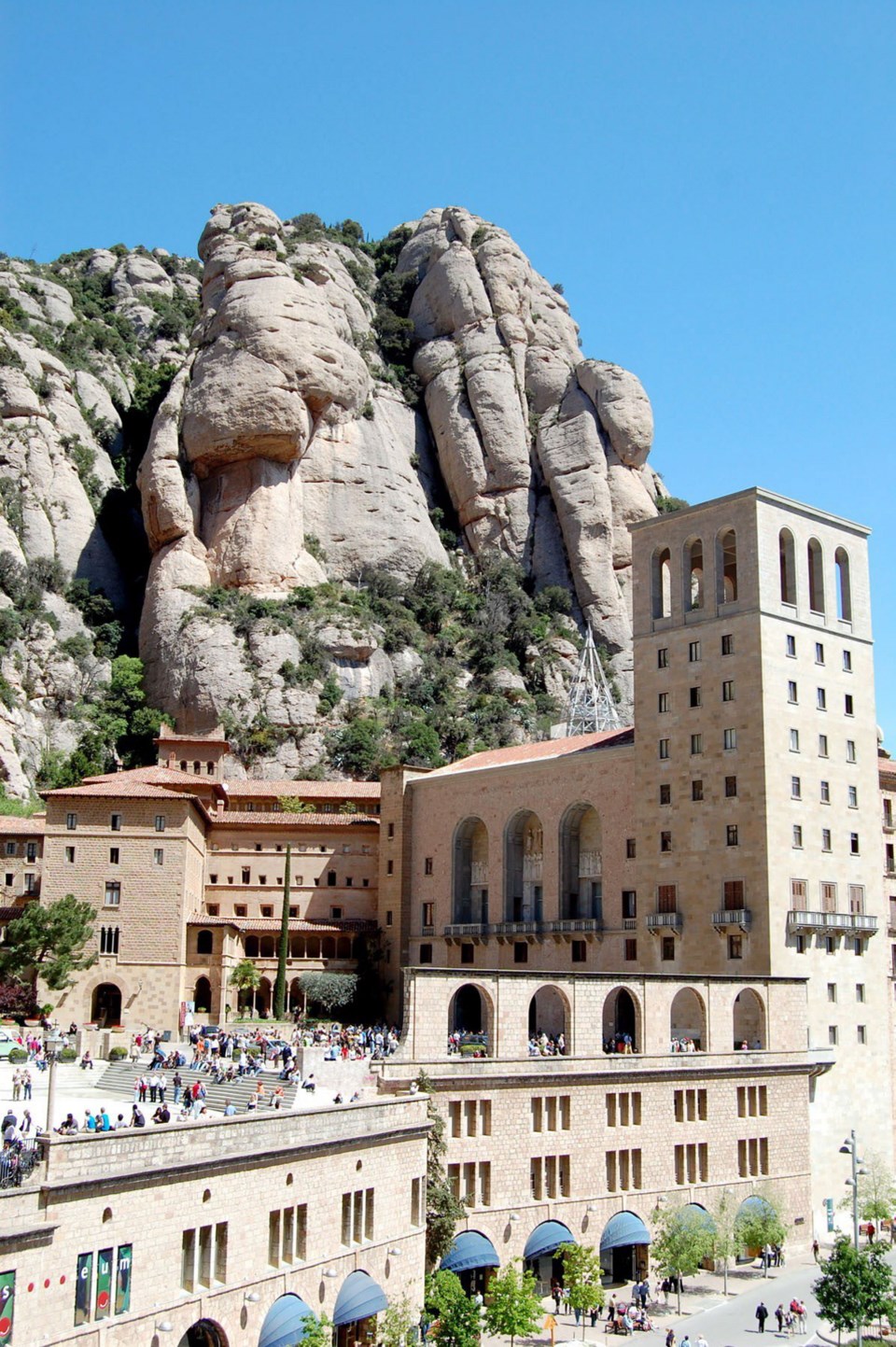If you want a break from the crowds, several day trips from Barcelona are tempting scene-changers: the mountaintop monastery of Montserrat, the Salvador Dali museum at Figueres and the beach town of Sitges.
For almost 1,000 years, Benedictine monks have lived atop Montserrat — the “serrated mountain” — which dramatically rockets up from the valley floor northwest of Barcelona. Poets claim that the mountain was carved by little angels with golden saws. Geologists blame nature at work. Either way, with its unique rock formations and dramatic cliff-clinging monastery, this is an inviting excursion for pilgrims with (or without) hiking boots. A one-hour train ride from Barcelona links up with a rack railway or a cable car to get you to the lofty site. Serious pilgrims walk up.
Legend has it that in medieval times, shepherd children saw lights and heard songs coming from the mountain. They traced the activity to a cave, where they found a statue dubbed La Moreneta, the Black Madonna. The monastery quickly became a pilgrim magnet. The small wooden Mary is behind protective glass in the Montserrat basilica, but the royal orb she cradles in her hand is exposed, ready to receive the venerating touch of the faithful. Newlyweds in particular seek this Mary’s blessing.
For hikers and nature lovers, a funicular climbs nearly 300 metres above the monastery. Up top, the air is fresh and the views are spectacular, sweeping (on the clearest days) from the Mediterranean to the Pyrenees. From the trailhead here, well-signposted hikes radiate out. The most popular one is mostly downhill back to the monastery. Hiking along the peaceful trail makes me want to turn cartwheels.
If you’re a Dali devotee, head to Figueres (two hours north of Barcelona) and the strange, fanciful Dali Theatre-Museum. From the Figueres train station, it’s an easy 15-minute walk to the museum. You can’t miss it — it is painted pink, studded with golden loaves of bread and topped with monumental eggs and a geodesic dome. For fans of Surrealism and Dali, it’s one of Europe’s most enjoyable museums.
Much of the art in the building (a former theatre) is movable and coin-operated, so have a few euro coins in your pockets when you go. You know how you can never get a cab when it’s raining? Pop a coin into Dali’s personal 1941 Cadillac, and it rains inside the car.
Another highlight is the Mae West room. From just the right spot, you’ll see that the sofa lips, fireplace nostrils, painting eyes and drapery hair come together to make the face of the sultry actress. Wandering around this place, I can’t help wondering: Am I crazy, or is it Dali? The artist himself is entombed in a crypt below centre stage.
If you simply want to kick| back without an agenda, go to welcoming Sitges, which has frequent 30-minute train service from Barcelona. With a much slower pulse than Barcelona, this resort town southwest of the city is a perfect break from sightseeing. Sitges has jet-set status, but it’s hung onto its Old World charm while managing to be both family- and gay-friendly.
There are Modernista-style mansions here and a few worthy little museums, but I recommend just poking around the old town’s whitewashed streets, crammed with cafés and boutiques. Then head for the water to soak up the sun, sea and sand.
Nine beaches, separated by breakwaters, extend southward from town (the last three are intimate and cove-like). Stroll down the seaside promenade or rent a beach chair for some extreme relaxing. Along the way, you have your choice of restaurants and chiringuitos (beachfront bars) for tapas, paella and drinks.
If you happen to visit during one of Sitges’ two big festivals (St. Bartholomew in late August and St. Tecla in late September), you may see teams of castellers competing to build human pyramids up to 20 metres high. Balancing on the shoulders of the people below, the castellers are judged by how quickly they can assemble and take down their people towers. No one is really sure how this quirky tradition got its start, but it’s a perfect reflection of the region’s team-building bent.
Skipping out of Barcelona for the day is easy. Whether you experience the sacred, the surreal, or the seaside, you’ll return to the city recharged and ready for whatever it has in store.
Rick Steves (ricksteves.com) writes European travel guidebooks and hosts a travel show on KCTS Seattle. Email him at [email protected] and follow his blog on Facebook.



